To be successful in project management, professionals must adhere to specific values like honesty, responsibility, respect, and fairness, which are central to the project management profession and are encompassed by ethics in project management. Therefore, understanding these values and how to apply them is essential for working in project management.
Ethics is important in day-to-day interactions and behaviors in the project management world. “Ethics is about making the best possible decisions concerning people, resources, and the environment,” according to the PMI (Project Management Institute). Ethical decisions can reduce risk, advance positive outcomes, build trust, determine long-term success, and build reputations.
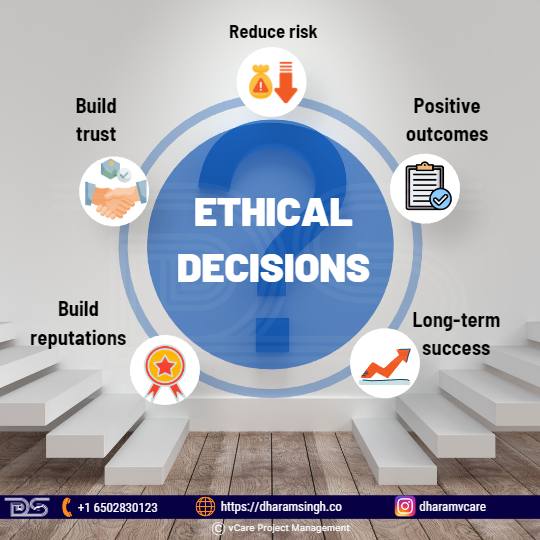
Ethical Decisions
Corporate leaders are responsible for ensuring that their employees practice ethics in the workplace. Failing to follow ethics might result in numerous scandals. The project manager must ensure that all projects are managed and executed efficiently and ethically. If a project manager is ethical, they can influence the project team to work ethically and ensure that all project work is done ethically.
PMI Code of Ethics and Professional Conduct:
PMI has identified four values for ethical behavior in the project management profession, which can be applied amongst project team members to maintain project loyalty and ethics.
Honesty: Be genuine in your communication and behavior
Responsibility: Take responsibility for your decisions and actions and the consequences that result from them.
Respect: Admire yourself, others, and the resources entrusted to you, such as people, money, and reputation.
Fairness: Decisions and actions should be unbiased, and behavior should be free of favoritism, self-interest, and prejudice.
Therefore, project management professionals must follow the Project Management Institute’s (PMI) Code of Ethics to ensure that all decisions taken are in the best interests of stakeholders and the project team.
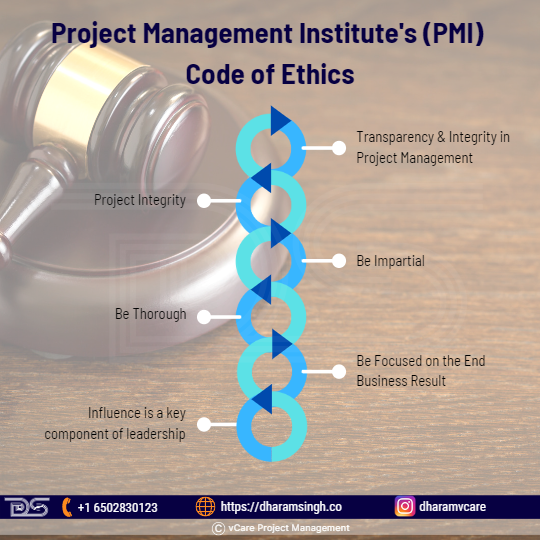
Project Management Institute’s (PMI) Code of Ethics
Transparency & Integrity in Project Management
Project management transparency characterizes a team’s open communication and visibility culture. Information in project management is on a need-to-know basis and is not readily available to everyone. A lack of transparency can lead to resentment or even distrust within the team. Transparency can advance a manager’s career, but it can harm the project manager’s reputation and career if carried out improperly. Therefore, there are many facts to believe that project managers should place a high value on openness and honesty.
The project manager’s transparency can lead to:
- Better performance and accountability
- Eliminates project derailment
- Enhancing teamwork
- Make sure people understand their tasks.
- Communicate openly and explain changes
- Provide and encourage feedback
- Promote knowledge-sharing
- Increase visibility with the right tools
- Focus on project budget
Project Integrity
As a project manager, acting with integrity with other project team members entails being open and honest about their expectations, intentions, and thoughts on their work. In addition, one must have the integrity to make the project team complete the project on time, within budget, and within the project’s scope.
Here are suggestions for acting with integrity with team members:
Be Impartial:
- Be objective and fair.
- Listen to both sides of the tale and different points of view without becoming attached to one in particular due to prejudice or favoritism.
- Rather than patching problems, objective decision-making fleshes them out and allows teams to get to the bottom of them.
Be Thorough:
Complete tasks entirely and thoroughly and validate the steps against a project management methodology of choice. This action ensures that a much more comprehensive project management plan and supporting documentation are created.
Be Focused on the End Business Result:
Regardless of when team members are introduced into the team, they should confirm initial business requirements and the work requested within the scope of their project role. This process enables them to provide their input based on their subject matter expertise, increasing the likelihood of project success.
Influence is a key component of leadership
To influence means to impact other people’s behavior, opinion, and choice. Influence is not the same as power or control. Instead, it is about recognizing what motivates employee commitment and applying that knowledge to boost performance and positive outcomes. The ability to influence others is a necessary leadership trait.
A leader’s ability to influence others is founded on trust; the project manager’s influence grows directly to the level of trust in a relationship. An effective leader motivates team members to act not through coercion but by eliciting their desire and conviction in the leader’s vision and goals. A leader who positively influences others through focused and deliberate effort will gain trust and become a driving force toward excellence.
Let’s look at how leaders can effectively build trust and influence with others.
- Establish credibility
- Engage with team members and build a connection
- Clarify expectations and practice accountability
- Share process knowledge
- Be open to influence
Relationship between stakeholders and project manager to maintain trustworthiness
Communication accounts for up to 90% of a project manager’s job. Conflicts can arise, and projects can fail if there is ineffective communication within the project team. Transparency in the project requires open, two-way communication with stakeholders about the status of a campaign. It keeps clients and stakeholders informed of campaign developments and other project activities.
Why is transparency important for stakeholders?
Transparency is essential in a client-facing project for one simple reason: it fosters trust. When project leader gains the trust of their stakeholders, they are more likely to gain their cooperation and guidance. Maintaining positive stakeholder relationships requires trust, and project stakeholders’ importance cannot be overstated. The support of the stakeholders is critical for project success.
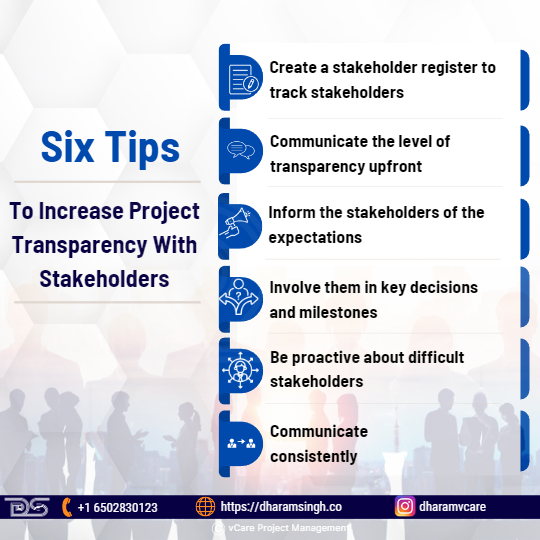
Six Tips To Increase Project Transparency With Stakeholders
Six tips to increase project transparency with stakeholders
- Create a stakeholder register to track stakeholders
- Communicate the level of transparency upfront
- Inform the stakeholders of the expectations.
- Involve them in key decisions and milestones
- Be proactive about difficult stakeholders
- Communicate consistently
Digital Transformation’s Impact on Project Management
Project managers have continued to manage project planning, acquisition, and execution, but their work is evolving with digital transformation.
Most project managers have already incorporated workflow and process automation technology in a few specific areas, like reporting and scheduling. And the majority of them are using digital platforms for project management which can help them stand separate.
How does a project manager acquire the knowledge and experience necessary to lead a digital transformation? What qualities are essential for this type of leader?
PMI’s 2018 Pulse in-depth report ‘Digital PM Skills’ survey conducted by Forrester Consulting for PMI among HR professionals and project managers and identified the top 6 digital-age skills required to get adapted in the digital transformation, like:
- Data science skills
- Innovative mindset
- Security and privacy knowledge
- Legal and regulatory compliance knowledge
- Ability to make data-driven decisions
- Collaborative leadership skills
Cybersecurity’s impact on projects
Project management and the need to establish objectives that protect information security are necessary for today’s project management world. Organizational fragility and vulnerability have increased due to digital transformation, and the proliferation of data and information has become abundant, so it is necessary to safeguard the data from getting misused. Therefore, many businesses are incorporating new elements into their projects to protect their information’s vulnerability, like:
- Security Plan: For the project’s security, a project leader must be aware of the risks to be addressed to develop a security plan. Taking them into account will help them chart the course of the plan and focus on the project’s objectives.
- Business requirements: The project manager must understand the project’s security requirements and business objectives to ensure its completion and success.
- Responsibilities: Each team member should be clear about their responsibilities in terms of security. The well-known RACI (Responsible, Accountable, Consulted, Informed) responsibility assignment matrix is used by many project managers, which aids in ensuring that project objectives are met.
- Security by design: Information security must be considered from the start of a project and throughout the process. Automating processes will improve project success and builds project security.
Pointers to incorporate cybersecurity in project management:
- Determine the project’s sensitive information.
- Evaluate the members’ responsibilities.
- Implement a level of information sensitivity.
- Understand security standards and regulations.
- Include security goals in the project’s objectives.
- Determine the company’s legal responsibilities to the information.
Technology vs. Ethics
Every facet of an organization disrupted by technology shows a possibility of gaining or losing stakeholders’ confidence and commitment. Technology advances can easily outrun the ethical standards that govern their application. Technology’s impact on project ethics is progressing similarly, with employers establishing ethical boundaries that violate employee privacy rights and limit communication abilities.
Some of the technology’s impact on project ethics
- Monitoring Team’s Communications
Project team leaders have monitored employees’ communications during working hours to keep employees focused on work tasks. In addition, because of digital technology and Internet access, there are more chances that project team members can get diverted and utilize the facilities in their personal activities.
- Working From Anywhere
The changing definition of the workplace impacts the ethics that underpin the traditional eight-hour work time. It is not ethical simply because technology allows project leader to access their employees and request work at any time. Increasing the working hours to nearly more than their actual hours also blurs the ethical lines in employee compensation.
- Using Company Property
Employees with restricted access to company property, such as a cell phone or personal computer, may treat it as personal property. An ethical issue may arise when an employee uses office property for non-work-related activities, such as looking for a new job or making personal calls. An employer must establish a clear policy regarding using company property loaned to an employee for business purposes only. This policy enables an employer to develop an ethical standard for using technology.
Ethical Decision Making in Project Management
Decision-making in project management is essentially a great reminder to project success. A truly accomplished project leader inspires, motivates, and builds a strong group that aids their team objectives. The concept of ethical decision-making has also been a focal point in improving project decision-making.
The ethical decision-making process and its roadmap
Every day, a project manager might make thousands of decisions and can come up with the best solution within nanoseconds of hearing about a problem. However, managers must regularly make major decisions incorporating more diligence, forethought, and collaboration with their colleagues. The failure in decision-making can create severe implications and chaos. Thus, organizational performance depends on good decision-making.
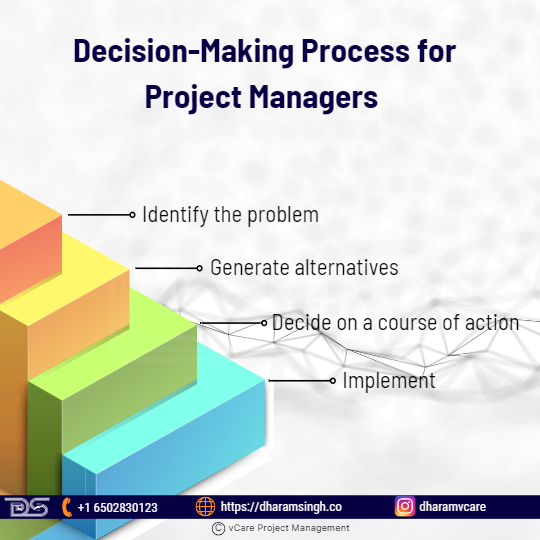
Decision-Making Process for Project Managers
Four steps that can comprise a basic framework for project managers’ decision-making process are:
1) Identify the problem
2) Generate alternatives
3) Decide on a course of action
4) Implement
Ethical Dilemmas in Project Management
The bigger the project, the greater the potential for people or businesses to compromise their moral standards to finish the project on schedule and within budget. The outcomes of project managers and other stakeholders ignoring debatable activity are disastrous, like blown budgets, legal concerns, and even criminal charges, which are too frequent in today’s project environment. Moreover, many businesses are aiming for 100% automation and implementation in the project management process. The project managers need to take charge of these initiatives, which might result in ethical dilemmas involving stakeholders, technology, or communities.
Ethical dilemmas arise when circumstances contradict the project manager’s professional standards or moral values. The project managers must ensure that a project fulfills its social responsibility and well-being commitments by keeping its long-term goals in mind.
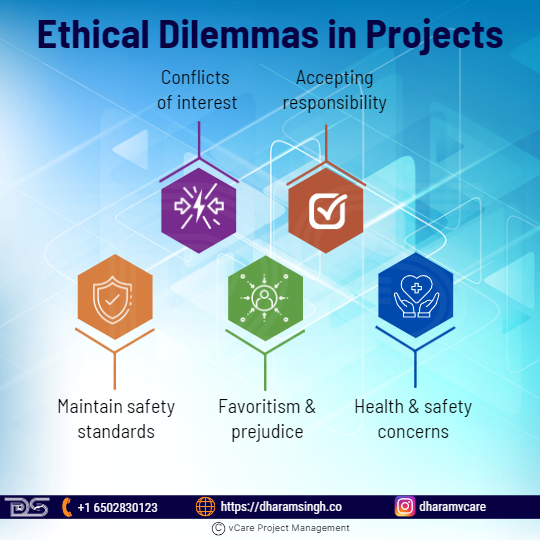
Ethical Dilemmas in Projects
Some Ethical dilemmas in projects include
- Conflicts of interest
For project managers, conflict of interest is a major ethical concern. A conflict of interest occurs only when an individual or group has multiple interests in a project, which may hinder the integrity of the process.
- Accepting responsibility
When a project goes wrong, managers may be tempted to blame workers, supervisors, or vendors for protecting their position. The manager may also consider concealing any evidence that could implicate them in the project’s failure. However, when a project does not go as planned, project managers have an ethical responsibility to accept their failures and start focusing on finding solutions to problems and getting the project back on track.
- Maintain safety standards
Project managers who limit safety standards to save money eventually discover the high costs of not enforcing safety standards with their team. Conversely, a project manager who follows proper safety standards can save a project from incurring costs ranging from minor errors to severe injury or death.
- Favoritism and prejudice
A project leader must not “pick winners” or show bias toward team members. Project managers should choose the participants based on their abilities, not personal preferences. A project manager who shows prejudice toward workers based on race, ethnicity, religion, gender, or other criteria compromises the project’s integrity and exposes the company to a discrimination lawsuit.
- Health and Safety Concerns
Large enterprise projects have high risks and intense deadline pressure. This pressure, unfortunately, can occasionally cause stakeholders to overlook or even hide problems that could endanger the health and safety of project associates or the general public. Although these problems are more likely to occur in the manufacturing, healthcare, or construction sectors, project managers in all sectors should be ready to notify authorities whenever they spot a potentially dangerous situation.
Does project loyalty depend on the individual?
Ethical behavior is essential in all aspects of life, personal and professional. Being an ethical professional benefits everyone, both individually and on a societal and organizational level. Organizations that practice ethics can make their employees optimistic, boost their confidence, and increase their dedication. They can easily draw new clients and consumers due to their honest and ethical behavior, which can significantly improve the project’s sales and profits.
The project manager’s responsibility in Project Management is to manage projects effectively and ethically, as projects are the primary means by which organizations achieve their goals and objectives and develop new services and products. Suppose a new product development project is managed and executed with unethical decisions and actions. In that case, the product will fail to impress and attract customers, resulting in a huge failure and a significant loss in terms of time, project budget, and resources. Customers, clients, and employees value honest and ethical behavior. Thus, a project manager can ideally follow the PMI Code of Ethics and Professional Conduct, which states that they must be honest, respectful, fair, and responsible.
Feel free to check out my discussion on this topic with Thomas Walenta in YouTube
For any questions related to your Project Management career, training, and certifications, you can book an obligation free 15 minutes session with me by visiting http://talktodharam.com/
You can subscribe to the vCare Project Management YouTube Channel to catch future videos of our Q&A series and certification success stories: https://bit.ly/2YF0wJl
You can subscribe to and follow my podcasts and interviews with Project Management Experts on YouTube at https://bit.ly/2NDY8wd



Recent Comments